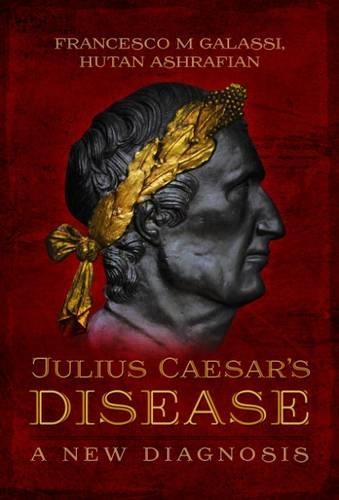
Julius Caesar's Disease
Publishing Details
Julius Caesar's Disease
By (Author) Hutan Ashrafian
By (author) Francesco Maria Galassi
Pen & Sword Books Ltd
Pen & Sword History
30th November 2016
United Kingdom
Classifications
General
Non Fiction
Diseases and disorders
937.05092
Physical Properties
192
Width 156mm, Height 234mm
Description
It is generally accepted as a historical fact that Julius Caesar suffered from epilepsy, an illness which in classical times was sometimes associated with divinely bestowed genius. The ancient sources describe several episodes when, sometimes at critical junctures, one of the most famous military commanders in history was incapacitated by his illness referred to as morbus comitialis. But does the evidence really fit with the diagnosis of epilepsy And if it was not epilepsy that afflicted Caesar, then what was it These are the questions that doctors Galassi and Ashrafian seek to answer by applying modern medical knowledge to the symptoms and circumstances described by contemporary historians and commentators of Caesar's life (which include the great man himself). The result is a fascinating piece of historical-pathological detective work that challenges received wisdom about one of the most famous men of all time.
Reviews
"Dr Galassi is a paleopathologist at Zurich University; Hutan Ashrafian is a surgeon and paleopathologist at Imperial College London. Both men are perfectly well qualified to re-examine Caesar's symptoms and to offer an alternative diagnosis to the well accepted one of epilepsy... I am of course not qualified to comment on their findings or proposed diagnosis, but I found the book to be both readable and informative, and a worthy addition to the various biographies of the great man, most of which concentrate on his military prowess and politics. A most fascinating read."-- "Books Monthly"
"Irrespective of whether one agrees with the authors' conclusions, this books is thoroughly researched and referenced, well-presented, and will be of interest to anyone with a keen eye into the past, especially to historians of medicine."-- "British Society for the History of Medicine"
"Using their medical knowledge and expertise, they examine the several possible reasons for Caesar's poor health, hoping to explain his many symptoms which included "faints, dizziness, psychomotor changes, headache, nightmares, choleric outbursts, etc.""-- "United Nations of Roma Victrix (UNRV)"
We will never know for sure whether Caesar actually suffered from TIA, which the authors themselves acknowledge, but thanks to them a thorough biomedical profile has finally been made available for paleopathologists, historians, philologists and neurologists alike, who will then be able to expand their researches on the matter. For the ordinary history lovers, however, this book allows them to feel closer to Caesar, the real man who lived before his myth, and like him perhaps dreaming of eternity.-- "Academic Journal of Neurological Sciences"
Author Bio
Francesco Maria Galassi, MD, is a paleopathologist at Zurich Universitys Institute of Evolutionary Medicine, where he serves as Assistant and Principal Investigator of the Italian Paleopathology Project. He graduated from the University of Bologna and has collected research experiences at the University of Oxford and Imperial College London. Besides studying osteological remains and mummies, he specialises in the analysis of ancient texts in order to identify the historical presentation and evolution of diseases throughout history. Amongst his most acclaimed studies, the causes of death of Alaric I and Giovanni Boccaccio. Aged only 27, Francesco Galassi is one of the youngest palaeopathologists in the world and already an expert in the field of palaeomedicine. Francescos studies have received worldwide attention in quality papers such Forbes Magazine, The Guardian, The Telegraph and he regularly features in the press and radio-TV programs as commentator of paleopathological research. Hutan Ashrafian, BSc Hons, MBBS, MBA, PhD, MRCS is a surgeon, historian, systems biologist, biostatistician, paleopathologist and philosopher. He is currently lecturer in surgery at Imperial College London and surgeon registrar at Chelsea and Westminster Hospital in London. His historical and paleopathological work spans the era of Alexander the Great and the classical world, epistemology and the earliest world literature from the Ancient Near East, art and science in the renaissance focusing on the work of Leonardo da Vinci. As an Egyptologist, he has offered the first pathological analysis of the Great Sphinx and his analysis of the death of Tutankhamun was featured in documentaries on the BBC and the Smithsonian Channel. He is the founding president of the Institute of Polymaths.
